"Each generation rethinks history, searching the past for answers to today's questions": War and genocide through the eyes of a Ukrainian officer with a PhD degree in history
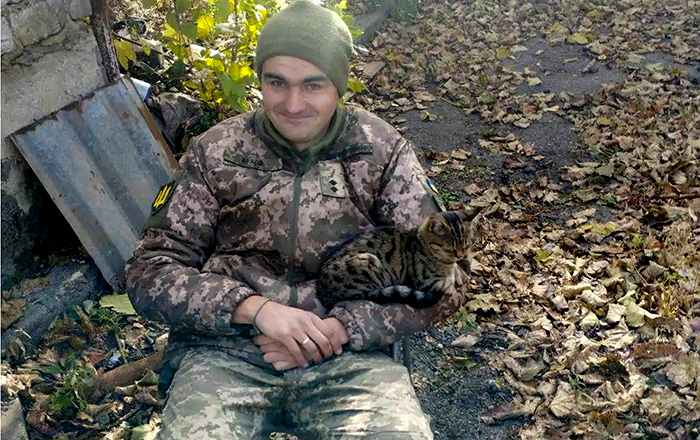
Many historians who studied wars and genocides before the war are now serving in the Armed Forces of Ukraine. When the Russo-Ukrainian War began, they had to take up arms to defend Ukraine's independence. How did the city of Dnipro perceive the war in 2014? What transformations has the Ukrainian army undergone during the war? What does it mean to be a Ukrainian officer today? What does a soldier feel when s/he communicates with the families of their fallen comrades? Can the actions of the Russian Federation in Ukraine constitute genocide? Yehor Vradii, Candidate of Historical Sciences, a specialist in the history of the Holocaust in Ukraine, and a military officer, responds to these questions.
"My sense of war appeared back in 2014, although it was not as acute as it is now"
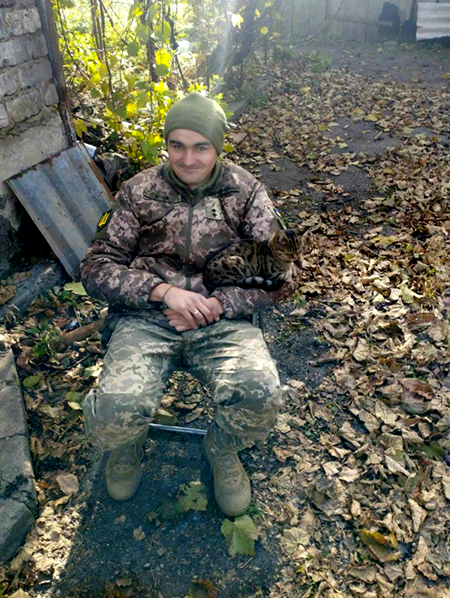
When did the Russo-Ukrainian War start for you?
It's hard to say. For me, it began in late April 2014, when the 20th Territorial Defense Battalion was being formed in Dnipropetrovsk oblast. I was summoned for a week to the district military enlistment office, where I met the deputy of the battalion, Serhii Demchenko. He was one of two soldiers in the municipal police department who were killed in Mariupol on 9 May that year. Demchenko was killed by a sniper's bullet, as I found out later. So, the sense of war appeared back in 2014, although it was not as acute as it is now because there were no explosions or air raid sirens going off in Dnipro.
What level of military training did you have at the time?
I had military training that was standard for students of the History Department at Dnipro National University (then known as Oles Honchar Dnipropetrovsk National University). My military occupational specialty was deputy company commander for moral and psychological support. However, not all students went through military training at the time, although some of us acquired certain skills at the military training department. Furthermore, some of our graduates joined the Armed Forces of Ukraine (ZSU) ranks back in 2014 and gave their lives. For example, Oleksii Tyshchyk, a graduate of the Law Faculty, was killed at Donetsk Airport in September 2014, if I am not mistaken. After learning of her son's death, his mother killed herself. Another graduate of our university, Kyrylo Nedria, who was already a Candidate of Historical Sciences when he was conscripted in 2014, led the defense of the new terminal at Donetsk Airport, where he suffered a concussion. Later, he was awarded the Order of Bohdan Khmelnytsky. Kyrylo is continuing to serve in the Armed Forces of Ukraine.
"Dnipro was a kind of transit point between war and peace"

Could you share some memories of how the residents of Dnipro reacted to the events of 2014?
You know, Dnipro is reacting in many ways even now. At the time, I had an opportunity to compare my city with Kharkiv, for example. One striking difference between these cities was the overall atmosphere. Dnipro was a kind of transit point between war and peace. This was especially evident at train stations, where the number of military and volunteer posts was off the scale. In 2014, Dnipro suffered a lot because of the killed and wounded soldiers who had served in volunteer battalions. For example, the now-famous 93rd Separate Mechanized Kholodnyi Yar Brigade and the former Dnipro-1 Battalion suffered harrowing losses, including the tragic events at Ilovaisk, which culminated in the treacherous killings of our warriors who were leaving the encirclement. Because of all this, there was a special spirit in Dnipro, the constant feeling that the war was very close, less than 200 kilometers away.
Nevertheless, there was a part of the city in which nothing was happening. Even now, people in various corners of Ukraine do not sense the war so acutely. For example, in March this year, when I went on an extensive leave, I was astonished by the general calmness and absence of anxiety among people.
What was the linguistic situation in Dnipro?
It is difficult for me to say right now, but I can offer a simple and complex example. I worked in the Faculty of Humanities at the Dnipro Medical Academy, where I observed a painful dividing line. Students from Cherkasy, Chernivtsi, and Kirovohrad oblast, who had spoken Ukrainian since birth, were becoming Russophones by their third year. Both the city and the teaching process had an impact on this. Many lecturers at the time were not ready to switch to the Ukrainian language and sought various arguments for this. The experience of Moroccan students, whom I taught the history of Ukrainian culture, was very telling. They spoke Ukrainian from the very first days. There is a simple explanation for this: For nine months, they studied in the preparatory department at Ternopil University, where they learned the language of the country, Ukrainian. In contrast, international students learned Russian in a similar preparatory department in Dnipropetrovsk (as the city was called then) before 2014. Then, the beating of our female student from Cherkasy became public. The assailant, hearing the girl speaking Ukrainian on the phone, resorted to violence, saying that the Maidan had happened because of people "like her."
In Dnipro today, no one stares at you when you speak Ukrainian on public transport, although that was commonplace earlier. One of my colleagues is quite patriotic, but he thinks and posts in Russian. He compares this habit to smoking, and he believes that, just like smokers have become isolated because of the ban on smoking in public places, the rise of designated smoking areas, and fines for breaking these regulations, the Russian language in Ukraine will soon become like a "bad habit," without any sanctions.
"I was in the army from February 2022 to late July 2023"
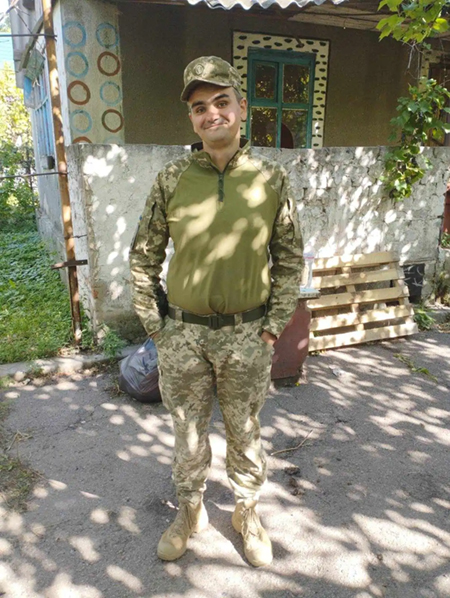
Did you prepare for the start of the full-scale invasion?
I had a presentiment that events would unfold on an even larger scale in late 2021. I was at home in Dnipro on 24 February 2022. Woken up by a powerful blast, I hoped for some time that it was a gas explosion. But after the second and third blasts, it became clear that this was no municipal accident. I turned on my phone and saw Putin's speech.
I would be glad to say that, having predicted everything, I was prepared, but I was not. On 24 February, my family and I remained home, trying to figure out what to do next. Leaving was out of the question, although I am grateful to my colleagues in Germany and Poland who instantly offered refuge to my wife and child. It was difficult to move around, so we decided not to head out but went the next day to my wife's parents near Kamianske [1], where the situation was calmer. On 27 February, I returned to Dnipro, and my wife and son, who had just turned six months old, stayed with her parents. She categorically refused to leave the country without me.
After returning to Dnipro, I tried to join a Territorial Defense brigade. An immense crowd of anxious people, which had formed next to a recruitment point, was informed soon after that the staffing was complete. The only vacant positions were for four cooks. So, on 28 February, I went to my district military enlistment office and was in Cherkaske by evening. [2] In this military town that same day, I was appointed deputy commander of the Engineering and Sapper Company of the Engineering Support Group of the 60th Separate Infantry Brigade, now called the 60th Separate Mechanized Inhulets Brigade. I was in the army from February 2022 to late July 2023.
My brigade did not belong to the personnel category but was part of the reserve corps. This meant that during peacetime, it consisted of several hundred people, primarily commanders of units without subunits. All these units began to fill up after war footing and mobilization were introduced. A four-hundred-strong brigade could increase to five thousand, which is what happened to our unit. In addition, due to rapid and large-scale staffing, you could see that some people who had served together for half a year did not even know each other's first and last names.
"It is important that someone take on responsibility for others"
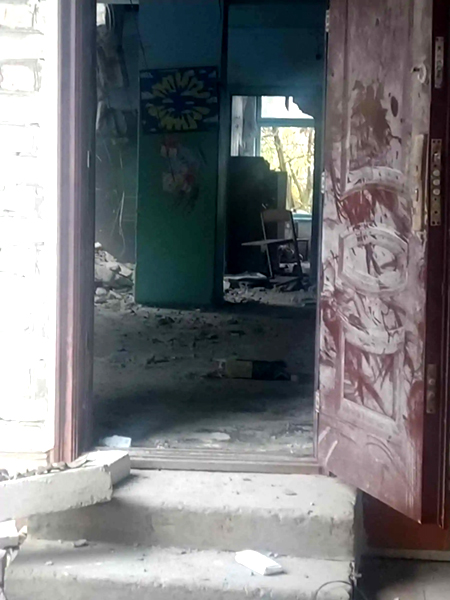
As of 9 March 2022, our unit was in the combat zone in the vicinity of Kryvyi Rih when Russian sabotage groups began entering from the Inhulets direction. At that point, I dealt with absolutely everything. I started performing my duties in late March when the first battle occurred near Koshove. [3] On paper, we were sappers at the time, but in fact, we carried out infantry functions, which was very funny to me because we had neither helmets nor bulletproof vests. We did have machine guns and magazines with cartridges. Right before the battle, we acquired NLAW missile launchers that we were seeing for the first time. The instruction time for their use lasted ten to fifteen minutes. There were practically no cadre officers. Volodymyr Khvorostovsky, my colleague from another company, and I had to make decisions. He is still serving in the Armed Forces of Ukraine. During the first battle, three of our people were killed, including one soldier from the Engineering Support Group.
How did you and your comrades-in-arms view the enemy at the time?
At first, our perception of the Russians as an ignorant and miserable army on its last legs helped lift our guys' spirits. The burned-out enemy columns in the Kyiv region, media announcements about flowerpots knocking out drones, etc., led to a certain profanation of the armed forces of the Russian Federation. Many came to feel that after a few of our shots, the Russians would begin to surrender. Frankly, I did not share this general euphoria. After the first artillery volleys in Koshove, some of our people began to react differently to events. I think that many quickly realized that losses were inevitable. I remember that after our senior officer was killed, Vova and I took over the command. That was when we first noticed how exhausted, desperate, and frightened the guys going into battle were. They didn't even have the strength to carry their weapons and supplies and left them by the side of the road, and we picked them up later. Then, I thought that for the majority, it was important that someone could take on responsibility for everyone. Even a "nominal officer" (a so-called "jacket," as graduates of military training departments are mockingly called in the army) handing down decisions, maybe not always the right ones, could restore the entire unit's combat capability. It is important in such moments not to show doubt because even a seemingly misguided decision can bring about a positive result. This is a kind of psychological support.
"Because of intense experiences, half a year at the front equals ten years at home"
Can you explain the phenomenon of comradery?
I don't know how to explain this phenomenon. I won't say that all those that I served with were close to me. I was in groups of different ages with absolutely distinct experiences. Of course, some of them are people with whom you have spent nearly a year and a half shoulder to shoulder. Civilians often perceive service in the Armed Forces as constant stints in trenches. This is not the case. Eighty percent of the time goes on getting daily life set up, and only 20 percent on combat operations. Space and time lose their characteristics completely. That's why it seems that, because of intense experiences, half a year at the front equals ten years at home. That's why experiences, compressed in space and time, foster closeness and cohesion.
To what age group do your comrades-in-arms belong?
At the time, when I went into my first battle with my best friend, Vova Khvorostovsky, he had just turned 24. Our commander, who was killed on 14 May 2023 in Bakhmut, 50 meters from us, was 51. One of the soldiers under my command was from Tsarychanka raion [4], who had changed his date of birth on his military ID from 1959 to 1969. One day, I spotted this inconsistency. When I asked why he had done this, he replied: "I really wanted to get taken on here!" But the most important thing was that this older man never once complained about the long treks or the difficult physical activities. The youngest soldier in our unit was 22, and the oldest was 63. One's age at the front is not a definitive factor because mature males can behave like children and vice versa.
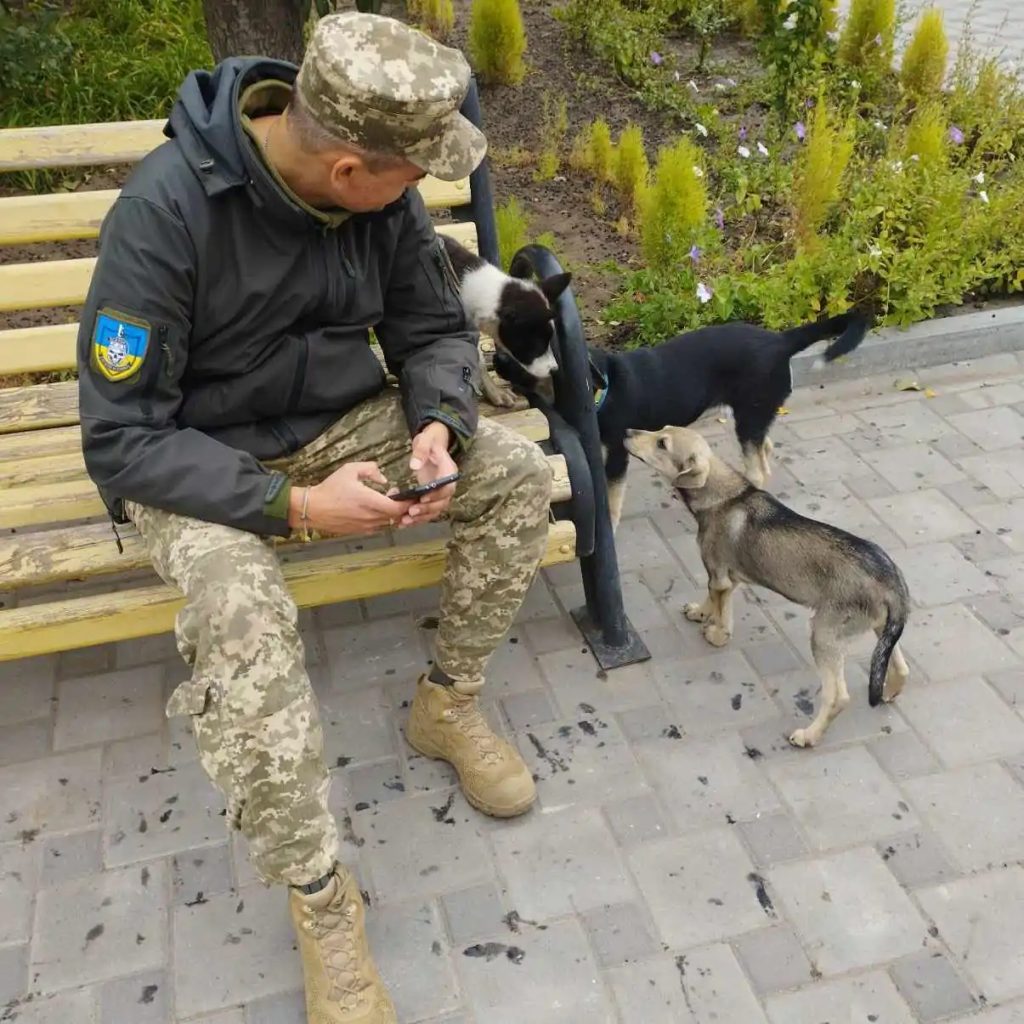
How is everyday life organized at the front?
There is no clear-cut division of duties at the front. In our unit, one man became a cook only because there was a note in his military ID that he served as a cook in the Navy in the late 1990s. He didn't want to be a cook again, but there wasn't much choice. Incidentally, he is still cooking for his comrades-in-arms.
Sappers usually live and work in small groups. At a certain point, these groups drive out on their missions, and following security standards, especially in a combat zone, they live in populated areas. We were supposed to settle in various places. The sergeants and group commanders themselves organized everyday life in these groups. Each unit had a sergeant responsible for material support.
Daily life determines much. We tried to set up areas where people could wash, eat, and sleep because many things depended on this. After a year of combat operations, people began to have health problems due to exhaustion. Some had been wounded and suffered concussions; others suffered from chronic illnesses. That's why there was severe emotional deterioration within a year. The assistance of local residents was very beneficial. Our unit was stationed in Dnipropetrovsk, Kherson, Chernihiv, Rivne, and Kyiv oblasts, as well as in Kyiv, and we received support from the civilian population.
Are you in touch with the civilians who helped your subunit?
To my shame, I must say that these people write to me more often than I do to them. They are from all the places where we were stationed. They call; they are worried about me and the guys, as though we are their children.
How do military call signs come about?
Before the first battle, the brigade's Chief of Staff asked us: "What are your call signs?" This was not an important question for me. When asked about my profession, I said I was a historian. That's how I got my call sign—"Istoryk." Vova, whom I have mentioned several times, is a rail engineer. He chose "Fiksyk" [Fixer] as his call sign. Eventually, a part of our unit was formed, which was constantly sent to reinforce the infantry, so people began calling all of them "Fiksyks": "This is the Fiksyks' position." and "The Fiksyks did this." Some people deliberately chose call signs for themselves. We had "Prohres" [Progress] (he had the appropriate skills), "Psykh" [Psycho] (a choleric temperament), and "Sayid" (he had a bald spot, like the protagonist in the film White Sun of the Desert).
"The most important thing at the front is to find people who are on the same wavelength as you"
What helps soldiers at the front not to lose their sense of optimism?
The most important thing at the front is finding people on the same wavelength as you. Unfortunately, not everyone succeeds. Contact with family is also essential, but the people who support the most are next to you. My comrades-in-arms and I had certain daily rituals connected with reveille and rotation of activities, and of course, we always tried to be available for personal conversations. Some unhealthy habits also appeared. For example, I had never smoked in peacetime, but I started during my tour of duty. In the beginning, group smoking was also a kind of ritual. But after the death of one of my comrades, I realized that I had smoked an entire pack of cigarettes in the space of three hours. I guess this could have been a protective function of my psyche.
Did your attitude to death change during your tour of duty?
I can't say that I wasn't afraid of death, although this fear sometimes appears quite rationally. The biggest problems with mental health begin not when you are in a combat zone but when you go for rehabilitation. It can be even more complicated when soldiers are released from military service and return to civilian life.
Did you ever have to inform the relatives about the death of their loved ones?
Earlier, in keeping with instructions, cadre officers were not at all supposed to contact fallen soldiers' relatives. The situation changed over time. However, according to my observations, not all units wanted to speak with the families of the fallen or those who went missing in action, not because of any bad intentions or callousness. Instead, it was because they could not find the words. Second, in combat operations, people had to take care of those alongside them. But we always communicated with the families of our comrades-in-arms. I spoke with the families of guys who went missing in action. The body of my killed commander is still near Bakhmut. I don't know if he was buried in a mass grave or whether he is still lying somewhere unburied. But I have talked with his family and am always in touch with them. The most important thing you can do is remember these people.
The most complicated situation is with the guys whose fate is still unknown. Despite the high likelihood that they are dead, their relatives believe [that they are alive] and are searching and waiting for them. It's a shame, but there are many cases where conmen try to enrich themselves in such situations by proposing "help" with searches for a fee.
"Both soldiers and society should prepare for the return of the guys from the frontline"
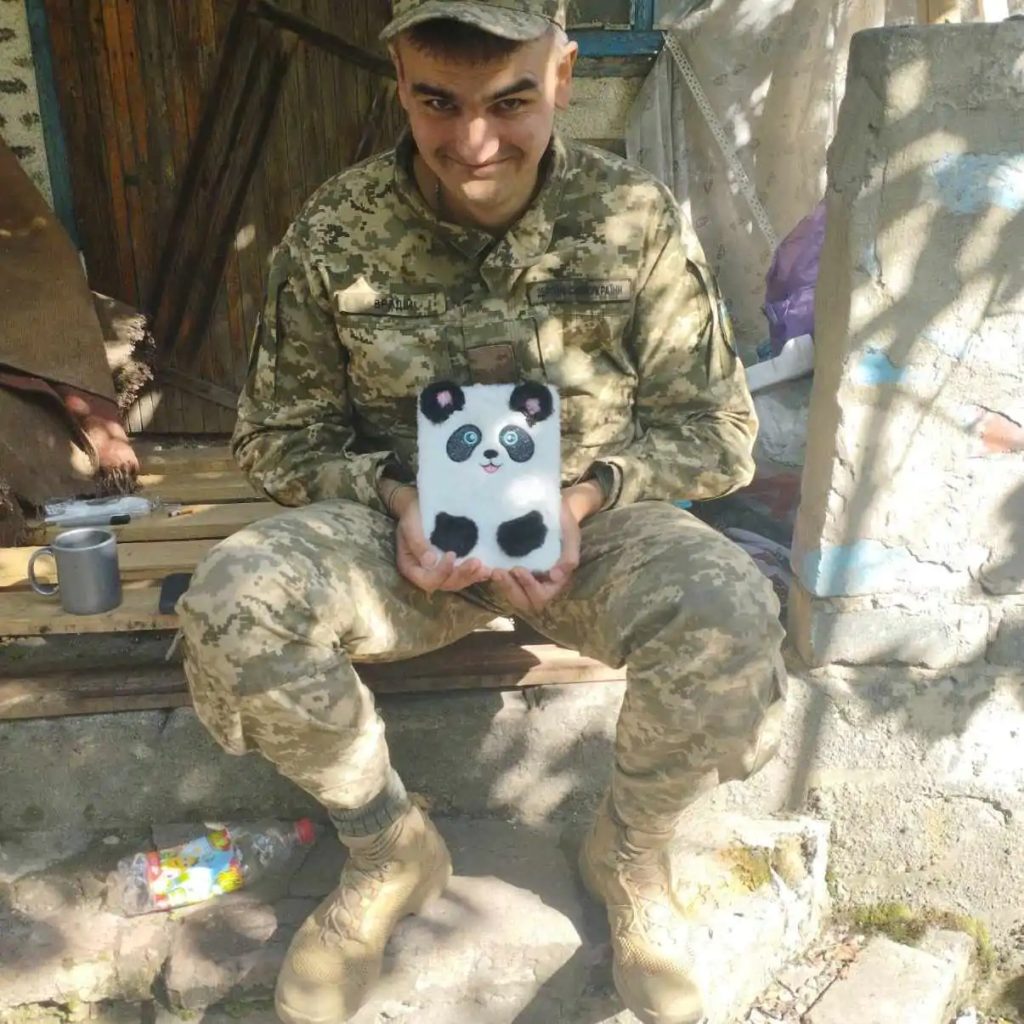
What is your view of the theory that soldiers returning from the front may pose a threat to civilians?
I think that society should not be uncomfortable around soldiers. I myself have seen how this happens. And I'm not talking about a desire to be the center of attention, but people's attempts to avoid soldiers are absolutely uncalled for. Both soldiers and society should prepare themselves for the guys' return from the front. Personally, I don't need to have attention focused on my army experience. It was the choice I made, above all for myself. The theory that all soldiers will return traumatized and commit crimes is faulty. I am not sure that soldiers' traumas are more severe than those suffered by some civilians.
How do you think the war will play out next?
I don't have a prediction, but I think this war will be long. Without some incredibly favorable combination of circumstances, the war may last a very long time. It is likely to flow into other phases. Still, society needs to prepare to live in a constant state of readiness for combat operations, similar to the Israeli scenario. In particular, we need to rebuild ourselves and become accustomed to being constantly ready for aggression from Russia and its satellite in the north (Belarus).
"If you speak Ukrainian in a Russophone milieu that has a certain degree of trust in you, this milieu begins to switch to the Ukrainian language"
Have you ever witnessed any misunderstandings between soldiers connected with ethnic or religious affiliation or because of a language conflict?
I did not notice any language conflicts. I once talked with Oleg Repan, a colleague from Dnipro National University, a Candidate of Historical Sciences whose field of study is the Ukrainian Cossacks, about the so-called "language sanction." The essence of this term lies in the following: If you speak Ukrainian in a Russophone milieu that has a certain degree of trust in you, this milieu begins to switch to the Ukrainian language. Before the war, I mainly communicated in Ukrainian, so people also switched to Ukrainian when they conversed with me.
I also did not encounter any cases of blatant xenophobia among my comrades-in-arms. Today, it is aimed exclusively against Russians. I have an interesting observation concerning ethnic Russians in the army. At the command's request, we conducted a survey using some points introduced back into personnel cards in Soviet times. One point was "nationality." Some of our people often openly identified themselves as Russians, which was a demonstration of considerable courage. However, there was no display of hostility or even ridicule in the unit afterward.
I am very cheered by the fact that there is a desire to value human life and the concept of human and officer dignity in the Armed Forces of Ukraine. Various people with different educational levels and ethnicities served in our unit. Miners from Pavlohrad raion in Dnipropetrovsk oblast were under my command. I called them "Westerners" because they were natives of the western Donbas (smiles). These guys could be quite unguarded in their speech, but you could always rely on them in battle.
"Moisei served side by side with me"
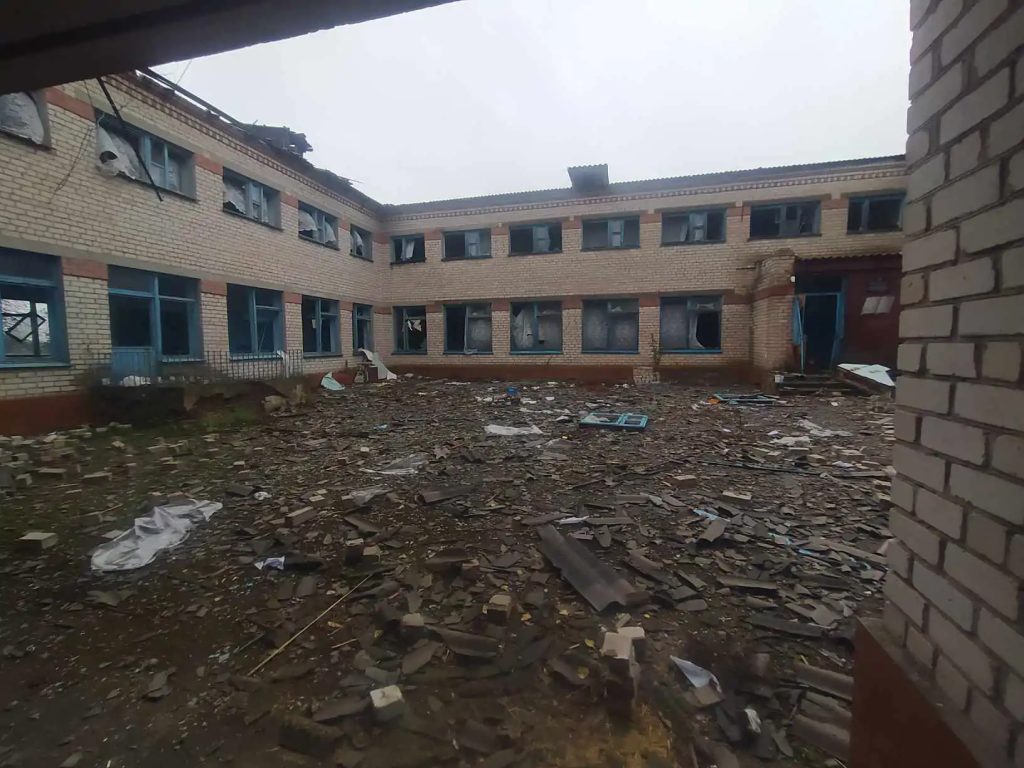
You study Jewish topics and the Holocaust. Could you share your thoughts on the common and distinctive characteristics of the genocides in Ukraine in various historical periods?
The international definition of the concept of "genocide" is based on two examples: the Armenian genocide during the First World War and the genocide of the Jews and Roma during the Second World War. All other genocides that have not become the focus of the legal definition established by the Genocide Convention are still not considered as such. The Holodomor of 1932–1933, which by its very essence was a genocide, can serve as a brilliant example. It is very good that, on the political level, many countries do not question this fact at all. In analyzing contemporary events, particularly the forcible abduction of Ukrainian children from Ukrainian territories to Russia and their forcible adoption by Russian families, one can speak with certainty about the hallmarks of genocide. The list of similar crimes includes the physical destruction of Ukrainians based on nationality.
Researching the experience of surviving the Holocaust, I see time and again that we study the behavior of people in certain circumstances in a specific historical context. The history of the Holocaust is the history of motivations, mutual assistance, and survival strategies. The same can be said about the experience of occupation, blockade, evacuation, etc., with which Ukrainians were confronted at the start of the Russo-Ukrainian War.
According to your data, what is the share of Jewish soldiers in the Ukrainian army?
I don't have accurate statistics on the number of Jews in the Armed Forces of Ukraine. No one identified as a Jew in my unit. Despite this, one of the soldiers under my command had a Jewish call sign. "Moisei" [Moses] served side by side with me (smiles). Some of the guys had obviously Jewish tattoos with Hebrew inscriptions, and the cook I mentioned always wore a kippah [5] with the proper emblem. When I asked him about the origin of this attribute, Yura did not give a clear reply. Among the Jews whom I know personally, there is not a single one with pro-Russian views. I am aware that Jews have died at the front. For example, in 2023, the son of the female principal of the 144th Jewish school in Dnipro gave his life for Ukraine's independence. Other members of the Jewish community, who served in the AFU back in 2014, are also defending our borders. I should mention the civic figure and Ukrainian officer Pavlo Khazan and his son, Andrii. Some researchers of Jewish topics are also soldiers; the name of Maksym Gon [6] springs to mind immediately.
Do Jews ever have to relinquish their traditions during their service at the front?
One of my friends, who served in 2014–2015 in the vicinity of Pisky [7], on the outskirts of Donetsk, told me that he had the opportunity to eat kosher food and sometimes even celebrate Shabbat, combat situation permitting. As I have already said, no one identified as Jewish in our unit, but we tried to meet religious needs as required. We had a Christian chaplain in our brigade. When based near a populated area, we tried to organize transport so people could attend church services.
"Israel and Ukraine are united by the fact of becoming the targets of a blatant terrorist attack"
How likely is the Israeli scenario in Ukraine?
This is a separate topic of discussion. In my view, Israel and Ukraine are united by the fact that they have become the targets of a blatant terrorist attack, although the roots of hatred toward Ukraine as a state and toward Israel as a state go much deeper. Moreover, both countries can be said to have experienced a failure in information politics. Attesting to this are the various attempts to justify the fait accompli of the terrorist attack in the media space. Is our society ready for the Israeli scenario? I'm not sure. Unfortunately, our society perceives the war that had lasted ten years as one that began only on 24 February 2022. Until then, only part of society felt pain and experienced tragedy. In Israel, most of the country's adult population has served in the army, preparing to defend themselves and their families potentially. What is also really important is that they processed the trauma of genocide long ago and drew the appropriate conclusions. In contrast, Ukraine has not processed the trauma of several genocides. I am talking about the Holodomor, the Holocaust, and the deportation of the Qirimli, [Crimean Tatars] and other ethnic groups from the Crimea. A large-scale discussion began during the presidency of Viktor Yushchenko.
At one time, my late commander said that the main precondition of the Holodomor was the lack of our own state. The Ukrainian SSR was not a full-fledged Ukrainian state because it was governed from the outside, which was why the occupiers were able to commit their horrific crimes. What is happening right now is one way to avoid a similar tragedy. I think that from the first days of Israel's independence, people had to defend themselves, and the awareness of this necessity has lived on for several generations. This, among other things, helps consolidate society inside Israel — not just Jews but Israel's other citizens: Christians, Muslims, and others. For the time being, Ukrainians are at the beginning of this path. We must realize that, even with the return of territories to the borders of 1991, Russia will not go anywhere. Even after returning to the recognized borders, missile strikes will not stop. So, we need a mechanism that will force Russia and other countries to reject the very idea of an armed attack on Ukraine.
"Each generation rethinks history, searching the past for answers to today's questions"
Do you think it is possible to process our traumas while the war is still going on?
This could be completely realistic both during and after the war. Each generation rethinks history, searching the past for answers to today's questions. I see that part of Ukrainian society truly wants to make sense of the many unprocessed traumas. On this path, apart from the independent work that every individual can do, it is essential not to forget the professional support of historians. The work of discovery should occur in constant interaction with specialists because discovering oneself envisions discovering one's past. We will definitely have to work through previous historical traumas, but, unfortunately, we are now experiencing a new trauma that we will have to process very soon. And only time will tell which of these traumas will require priority attention.
Thank you for your trust and meaningful conversation. Thank you for each day you spent at the front and your active stance!
Interviewed by Svitlana Makhovska
The photographs used in this publication are from Yehor Vradii's personal archive.
Endnotes
[1] A city in Dnipropetrovsk oblast. [2] An urban-type settlement in Novomoskovsk raion, Dnipropetrovsk oblast. [3] A village in the Shyroke rural community of Kryvyi Rih raion, Dnipropetrovsk oblast. [4] A former administrative-territorial unit north of the central part of Dnipropetrovsk oblast. [5] Traditional Jewish men's head covering. [6] A Ukrainian historian, political scientist, Doctor of Political Science, and researcher of Ukrainian-Jewish questions. [7] Pisky is a rural settlement in Pokrovske raion, Donetsk oblast.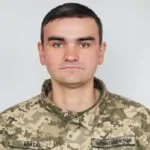 Yehor Vradii is Associate Director for Research at the Jewish Memory and the Holocaust in Ukraine Museum (Dnipro, Ukraine) and Associate Director of the Tkuma Ukrainian Institute for Holocaust Studies (Dnipro). He is a member of the Ukrainian-Polish commission in charge of streamlining school history and geography textbooks. In 2007, he completed his Honors MA in the Department of History at Oles Honchar Dnipropetrovsk National University. In 2012, he defended his dissertation "The Anarcho-Communist Movement in Southern Ukraine in 1905–1910." His current research interests are the history of radical political movements of the early 20th century, anti-Jewish pogroms of the 19th and 20th centuries, and the Holocaust on the territories of Poland and Ukraine. In November 2023, he was appointed editor of the annual Problems of Holocaust History: Ukrainian Dimension. He is the author of 27 scholarly works, including the co-authored monograph Holokost u Dnipropetrovs′ku (The Holocaust in Dnipropetrovsk, 2017), and the co-compiler of Holokost u Dnipropetrovs′kii oblasti: Dokumenty ta svidchennia (The Holocaust in Dnipropetrovsk Oblast: Documents and Testimonies, 2020).
Yehor Vradii is Associate Director for Research at the Jewish Memory and the Holocaust in Ukraine Museum (Dnipro, Ukraine) and Associate Director of the Tkuma Ukrainian Institute for Holocaust Studies (Dnipro). He is a member of the Ukrainian-Polish commission in charge of streamlining school history and geography textbooks. In 2007, he completed his Honors MA in the Department of History at Oles Honchar Dnipropetrovsk National University. In 2012, he defended his dissertation "The Anarcho-Communist Movement in Southern Ukraine in 1905–1910." His current research interests are the history of radical political movements of the early 20th century, anti-Jewish pogroms of the 19th and 20th centuries, and the Holocaust on the territories of Poland and Ukraine. In November 2023, he was appointed editor of the annual Problems of Holocaust History: Ukrainian Dimension. He is the author of 27 scholarly works, including the co-authored monograph Holokost u Dnipropetrovs′ku (The Holocaust in Dnipropetrovsk, 2017), and the co-compiler of Holokost u Dnipropetrovs′kii oblasti: Dokumenty ta svidchennia (The Holocaust in Dnipropetrovsk Oblast: Documents and Testimonies, 2020).
Originally appeared in Ukrainian @Ukraina Moderna
This article was published as part of a project supported by the Canadian non-profit charitable organization Ukrainian Jewish Encounter.
Translated from the Ukrainian by Marta D. Olynyk
NOTE: UJE does not necessarily endorse opinions expressed in articles and other materials published on its website and social media pages. Such materials are posted to promote discussion related to Ukrainian-Jewish interactions and relations. The website and social media pages will be places of information that reflect varied viewpoints.



















